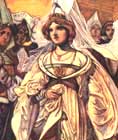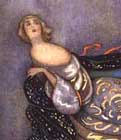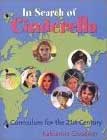
Cinderella:
345 Variants
by Marian
Roalfe Cox
SurLaLune's
Cinderella Area
SurLaLune Fairy Tales Main Page
287
Haukenäs, Th. S., Hardanger, Natur, Folkeliv, Folketro. 1891. VII. Pp. 579-588.
"ANNEMOR"
(Anna-mother = Anna darling).
ABSTRACT
Heroine's share of food always gets lost; father exposes her in forest because god-forsaken and luckless--Hill-man aid--Menial heroine (at palace) --Prince strikes her with clogs--Magic dresses, and brass, silver, gold, goats to ride, from hill man--Meeting place (church); (three gatherings for prince to choose bride)-- Threefold flight--Second meeting-place (ball) --Heroine wears rags over magic dress; dances with prince--Happy marriage-- Heroine sees her past life in magic mirror; pretends her laughter is because king's castle stands on brazen pillars, while her father's stands on pillars of gold. Prince would see it. Hill-man shows heroine where to find such a castle, which is to be her dowry.
TABULATION
(1) Poor fisherman, with many children, puts a fish aside daily for him and one for each child. The rest are sold by Annemor at the king's castle, and she buys oatmeal cakes with the money; one for father, one for self, and one for each brother and sister. She is obliged to cross a bridge, where she always loses her own loaf; she cries, and starves. By the time she gets home her fish has always got lost too. She gets some scraps from brothers and sisters, and so does not quite starve to death.-- (2) Father at length begins to doubt her being his child, thinking, "God, perhaps, does not know her as such, not allowing her to eat." He therefore exposes her in the forest, where her fortune may find her if it likes. They are weeping there together when an aged man comes and asks why. He offers to take Annemor away with him, but is not allowed to do so. He then asks if she would like to serve in king's castle. If she should ever Want him she has only to walk out to the bill hard by.-- (3) Annemor is engaged at the castle to carry water, cleanse the pots and pans, and sweep the floors. Everyone is kind to her, the prince excepted. One day he is not satisfied with the way she has cleaned his slippers (clogs), and gives her a box on the ear with them.-- (4) She goes crying to the hill, where the hill-man consoles her, saying that there are to be held three large gatherings of lords and ladies, that the prince may choose a queen. When everyone has started, she has only to repair to the hill, where she will find a brass he-goat on which to ride to church, and a brass dress to put on. The following time the goat and dress will be of silver, and the third time of gold. She must leave church before sermon is finished.-- (5) All happens in this manner. The brass he-goat is too quick for prince to catch him, though he takes his swiftest horses.-- (6) The third time the prince is so near to heroine that she Cannot wait to change her golden dress, but throws rags on over it.-- (7) Prince imagines the fair lady lives not far off, so invites time whole neighbourhood to a ball. Queen bids Annemor come, and drags her in during the dancing, in spite of her resistance. Queen begs one of the kids to dance with her. Annemor is a good dancer, and, in turn, everybody, even the prince, is glad to dance with her. Something like a gold circle seems to glitter beneath her dress. The faster she turns the more of it is seen.-- (8) At last she is obliged to throw off her rags, and when she stands in golden dress the prince asks for her hand and heart.-- (9) Next morning she goes to hill. Old man tells her that they will bring her a looking-glass, and she will see in it how once she hunted about and cried for her oatmeal cakes. The sight will make her burst into laughter; prince will ask the reason, and she must say, "Here the castle is built only on pillars of brass and iron; but my father's house stands on pillars of gold and silver."1 Presently, when she gives this answer to prince, he immediately desires to see this magnificent castle.-- (10) Annemor goes crying to the hill. "Don't be downcast," says the hill-man. "Drive in a straight line from here till you come to the castle. It is yours. It is your dowry from me."
NOTES
Note 37
(P. 249.) Compare "The Palace that stood on Golden Pillars",
Thorpe, Yule-Tide Stories, p. 64. (From Westmanland.)
Return to place in text.
Cox, Marian Roalfe. Cinderella: Three Hundred and Forty-five Variants of Cinderella, Catskin, and Cap O' Rushes, abstracted and tabulated. London: David Nutt for the Folklore Society, 1893.
While the original text of this book is out of copyright, the special formatting and compilation available on SurLaLune Fairy Tales is copyrighted. Be aware that while the original content has been honored, page numbering, footnote numbering, redesigned charts, links, and other aspects are unique to this site's version of the text. Use at your own risk. For private and fair use educational purposes only.
©Heidi
Anne Heiner, SurLaLune Fairy Tales
E-mail: surlalune@aol.com
Page last updated February 1, 2006
www.surlalunefairytales.com










